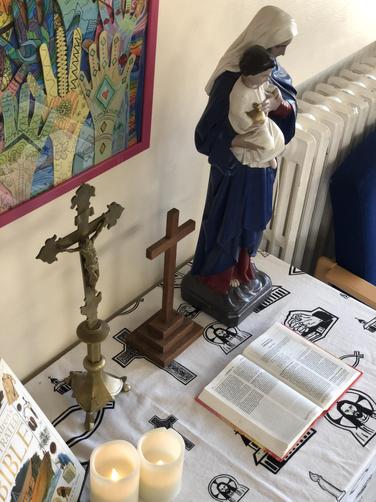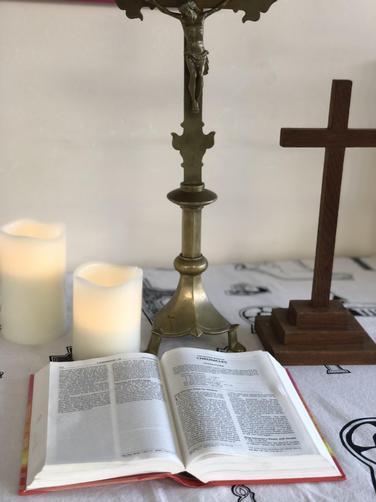RE and Collective Worship
A high quality religious education (RE) curriculum is essential to meet the statutory requirement for all maintained schools to teach a broad and balanced curriculum. At the heart of RE in church schools is the teaching of Christianity, rooted in the person and work of Jesus Christ. There is a clear expectation that as inclusive communities, church schools encourage learning about other religions and world views fostering respect for them.
This document outlines the expectations of the Church of England Education Office in relation to Religious Education. RE Statement of Entitlement for Church schools
Intent
- To enable all children to become religiously literate.
- To ensure RE enables all children to live life in all its fullness – vision for Education (Church of England)
- To offer a systematic enquiry-based approach to the teaching of RE so that the following skills in children can be developed:
- Ability to be critical thinkers.
- Ability to engage critically with texts.
- Ability to ask deep and meaningful questions.
- Ability to make connections within and across religions and world views.
- Ability to reflect, respond and express their own religious, spiritual and/or philosophical convictions.
- Ability to make their own choices and decisions concerning religion and belief based on a deep knowledge and understanding of religions and world views, belief systems, values and practices.
To offer units of learning that:
- Are rooted in theological concepts, strong subject knowledge and content.
- Offer a balanced curriculum which enquires into religions and world views through theology, philosophy and the human and social sciences.
- Offer sequential learning both in terms of knowledge and skills across the primary age range.
- Offer motivating, engaging and creative lessons for all children.
- Provide opportunities for children to develop empathy towards people of similar or differing religious or world views to their own.
To ensure the teaching of RE supports and enhances:
- The Christian vision of the school.
- Contributes significantly to the spiritual, moral, social and cultural development of children.
- Takes note of the Religious Education Church of England Schools – Statement of Entitlement.
- The Church of England’s vision for Education – every person deserves to live a ‘life in all its fullness.’
The syllabus has taken note of the 2013 national curriculum framework for RE, taking into consideration the following:
Three strands for RE learning:
- Know about and understand a range of religions and world views.
- Express ideas and insights about the nature, significance and impact of religions and world views.
- Gain and deploy the skills needed to engage seriously with religions and world views.
Six key areas of enquiry:
- Beliefs, teachings, sources of wisdom and authority
- Ways of living
- Ways of expressing meaning
- Questions of identity, diversity and belonging
- Questions of meaning, purpose and truth
- Questions of values and commitments
Implementation
Within every unit of learning, the following steps take place as part of the learning process:
Enquire: Engage with big and subsidiary questions which focus on theology. What are the big theological questions you are exploring?
Explore: What is the religious content and context being explored? How deep can we go? This ‘explore’ stage of the enquiry is where children will be primarily learning about religion and belief. In order for this to be effective, there are some strategies that can be used to ‘deepen’ learning:
- Interpreting and analysing sacred texts
- Using challenging and controversial questions
- Extended pieces of writing
- Discussion which continually asks ‘Have we gone deep enough yet?
- Children engage with authentic religious believers (face to face, via webcams, podcasts, video, skype etc)
- Grapple with complex theological concepts, questions and issues
Evaluate: What is our understanding of the concept? What impact does the concept have on the lives of believers? What difference does this belief/practice make? The aim of this part of the enquiry is to encourage dialogue about learning. Children should use skills of analysis and evaluation. The focus should be on the impact of the belief or practice on the religious or belief community being studied.
Express: What is our understanding and response to the enquiry question when considered from the perspective of the faith and belief traditions that have been encountered? What is our personal response? It should always be based on knowledge and understanding, not values or SMSC development.
Impact
- Children will be able to hold a balanced and well-informed conversation about religion and world views. (Religious literacy)
- Children will make good or better academic progress from their starting points.
- Children will be able to reflect, respond and express their own religious, spiritual and/or philosophical convictions.
- Children will be able to make their own choices and decisions concerning religion and belief based on a deep knowledge and understanding of religions and world views, belief systems, values and practices.
- Children will have developed a deeper understanding of what it means to live life in all its fullness.
Collective worship
Collective Worship is the “unique heartbeat of a Church school” and should be offered as part of a wider opportunity for pupils and adults to encounter faith.
At St Andrew’s Southgate Primary School, the daily act of collective worship is an integral and important part of school life. Through this and in the general ethos of the school we seek to promote our vision of: 'Do justice, love kindness and walk humbly with your God' Micah 6: 8. As a whole school, we come together every morning to share our love for God and others. We promote our school vision and celebrate the many ways in which we live out our school values of Courage, Compassion, Service, Peace, Thankfulness, Stewardship and Justice. We listen to scripture from the Bible and explore the meaning of Jesus’ teachings.
Collective Worship at St. Andrew’s Southgate takes many forms and includes the opportunity for pupils to experience prayer, music (including hymns), stillness, reflection, worship and to explore their own spirituality. As a whole school team we work closely with members of the clergy to ensure we provide engaging, meaningful and inclusive Collective Worship sessions in line with the Christian calendar.
Below is an outline of the daily Collective Worship sessions our pupils experience at St. Andrew’s Southgate;
Monday- Value and Achievement Assembly led by Mrs Pitsillides
Tuesday- Hymn practice led by Miss Monaghan
Wednesday- Whole School Collective Worship led by Fr Edd and Fr Tom
Thursday- Class Collective Worship led by Class Teachers
Friday- Teacher’s Assembly led by Class Teachers. Class Teachers will explore our school Christian vision, values and other religions with pupils.
In addition, individual classes will come together three times throughout the day to pray. This typically happens in the morning, before lunch and at the end of the day. Children are reminded that prayer is an important conversation with God and is a time to reflect, ask for guidance and give thanks.



